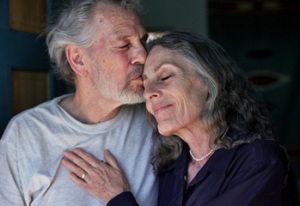Excerpt from The Five Things You Cannot Change by David Richo
“Our spiritual practices have a direct impact on the possibility of our showing love in relationships in an adult way: Mindfulness helps us practice attention, acceptance, and allowing. Loving-kindness helps us show affection and appreciation.
As a spiritual practice, ask yourself about the signs that your love for someone is truly unconditional:
- You feel a sense of connectedness with the other that endures and cannot be supplanted no matter what.
- You consistently have well-meaning thoughts and are wishing the best for the other.
- You can act kindly, at times even anonymously, with no expectation of anything in return.
- You sense your heart opening when you are with the other or thinking of her or him.
- You maintain a commitment to nurture the other and the relationship more than your own ego demands.
- You are no longer pushed or arrested by fears of closeness to or distance from the other.
- You do no engage in ego competitiveness or aggression, actively or passively.
- You are sensitive to how the other feels and go to any length no to hurt him or her intentionally.
- You have an effortlessly compassionate, forgiving, generous, and non retaliatory attitude in your thoughts and actions. (There is no vindictive force in the universe. Revenge is exclusive to humanity.)
- You keep your own boundaries intact so that your love is always unconditional, but your commitment is intelligently and appropriately conditional.
- You are aware of your partner’s negative traits and you see them with compassion and amusement without letting them impinge upon you. Am I willing to play on relationship’s full check board of light and dark?
Finally, unconditional love is entirely in the present tense.”
Some people may have learned all they needed to in kindergarten but somehow I doubt they learned some really vitally important lessons that many people in long-term commitments never learn.
When I read this passage, what I was reminded of (and am often reminded of) is how importance the cultivation of presence and compassion are, both to ourselves and to our interactions with others.
If we cannot be there and show up in our own lives, we cannot do it in a relationship. And let’s face it, if we cannot show up and be present, we have no relationship.
I am also struck by the fact that when we have this basic goodness, we can move farther up the hierarchy that Maslow put forth for us.
We have difficulty when those basic needs are not met or better yet, when we have the perception that our basic needs are not met.
But think about this: as a society , we are become more unhealthy — due to stress, diet, environment, community, pharmaceuticals, lack of priorities, etc.
Are we creating a society whereby in the pursuit of the “good life” we have created a living situation that impoverishes us and keeps us from achieving our highest potential?
The more we endanger our food supply, our surroundings, our bodies, our minds, the less chance we have of being able to be whole — or holy — and the less we are to be able to truly be in communion with each other and our world.
It’s an idea to think about . . . how do we reach the top levels of the pyramid, or greatest good, or anything transpersonal (or unity consciousness, etc) if we have food that does not nourish us, water that is undrinkable, and pain and disease from a multitude of sources.
Can we really have a lived bodily experience and sense of our Oneness, our interconnectedness, or our Interbeing as Thich Nhat Hanh suggests, if we are so ill at ease (dis-eased) in our world?
Can we use our spiritual practices to cultivate deep understanding of how the mandala of life truly comes together in harmony?
Related articles
- Spiritual practice (thabotizz.wordpress.com)
- The Spiritual Practice of Sleeping (bodytheologyblog.wordpress.com)
- Who is practicing yoga and meditation? (mydailyyogapractice.wordpress.com)
- Meditation as a Spiritual Practice…. (radhikabauerle.wordpress.com)
- Radical Presence and its Role in Spiritual Development (aquietrevolution.me)
- The Interconnectedness of Body and Mind – A conversation with energy worker Barry Kapke (hofholistichealingcenters.com)












You must be logged in to post a comment.